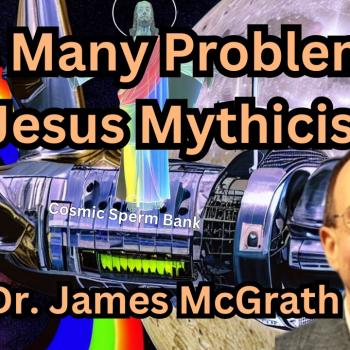My criticisms of mythicism must be on target. At least, that seems to me to be the best explanation for why one of its well-known internet supporters, Neil Godfrey, has written a post offering accusations which are so off target that I regard them as laughable rather than genuinely slanderous, and asked me to “honorably step down” from the discussion.
Godfrey has in the past even stooped to name-calling, and yet when someone offers substantive criticism of mythicism, he regularly resorts to accusing them of not being civil.
He is either an extremely adept and cunning individual who knows what to try in order to try to gain sympathy for his views, or he is out of his mind. I am not in a position to offer a diagnosis one way or another. All I can say is that I do not recognize myself in his accusations, and I believe that his post is simply yet another example of the ploy of conspiracy theorists to blame their critics and detractors, rather than the unconvincing nature of their own claims, for the fact that those claims fail to persuade. What do others think?
For those who want some useful insights into how scholarship of a variety of sorts works – from physics to biology to history – here are some useful posts I’ve found around the blogosphere.
Science Could Have It All Wrong, But.. (on assumptions in the natural sciences)
One person’s crap is another person’s treasure (on archaeological discovery)
Conversations on methods in historical criticism:
On the contradiction between “multiple attestation” and “embarrassment” in Historical Jesus Research
Why the Criterion of Embarrassment is Inadequate
Where single attestation is preferable to multiple attestation
John Hobbins and Scott Bailey have an exchange around words of Alvin Plantinga.
And specifically on mythicism, see Tom Verenna’s response to my latest installment in my review of Earl Doherty’s book. John Loftus has a post that is also relevant: some evidence may seem to support this view or that, and so it is disconfirming evidence that is usually the crux of the matter when it comes to the plausibility o otherwise of a point of view.
Unreasonable Faith discusses the fact that the internet unleashes an undifferentiated flood of information both reliable and bogus on its users. Ted Herrlich shares AiG’s response to a recent Doonesbury cartoon. Hemant Mehta highlights a new institution in Idaho that probably needs two sets of scare quotes inserted into its name, around “science” and “museum.”












